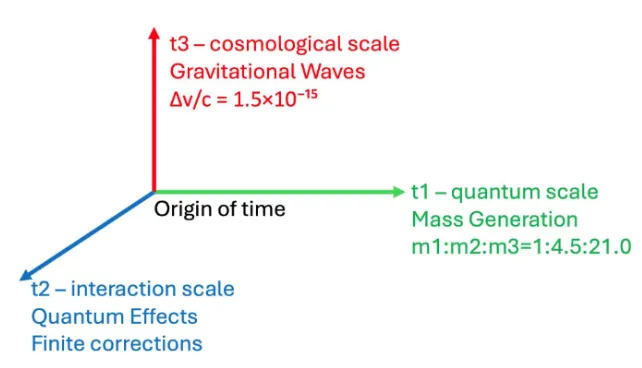3D Time Could Solve Physics' Biggest Problem, Says Bizarre New Study
Clocks might be far more fundamental to physics than we ever realized.
A new theory suggests what we see around us – from the smallest of quantum actions to the cosmic crawl of entire galaxies – could all be literally a matter of time. Three dimensions of time, in fact.
The basic idea of 3D time isn't new. But University of Alaska geophysicist Gunther Kletetschka says his mathematical framework is the first to reproduce known properties of the Universe, making it a somewhat serious contender for uniting physics under one consistent model.
"Earlier 3D time proposals were primarily mathematical constructs without these concrete experimental connections," says Kletetschka.
Related: Physicists Catch Light in 'Imaginary Time' in Scientific First
"My work transforms the concept from an interesting mathematical possibility into a physically testable theory with multiple independent verification channels."
Something is wrong with our current models of reality. While quantum mechanics and general relativity both explain our Universe to a degree that's uncannily accurate, each emerges from fundamentally distinct grounds – one granular and random, the other seamless and immutable.
These irreconcilable starting points make it a challenge to construct a single, all-ruling theory of physics that explains gravity in the same way as it does the other three forces. Not that theorists haven't tried.
Kletetschka proposes a complete rethink on the basics, pulling back the fabric of space-time itself to come up with a new bedrock to base reality on.
While we use the word time to describe virtually any series of events, there's a clear contrast in scale that extends from the near-instantaneous flitting of quantum particles to the eons of cosmic growth stretching into eternity.
On the cosmic end, time can be relative, distorting in relation to mass and acceleration. Up close, time is undecided, equally capable of looking to the past as it does to the future. And drifting in the middle is an existence as boringly predictable as tomorrow's sunrise.
Separating these scales into their own dimensions provides us with three paths to follow, each marching to its own beat at right angles to the others.
 Time flows in three dimensions in a new framework of physics. (Kletetschka, RAPS, 2025)
Time flows in three dimensions in a new framework of physics. (Kletetschka, RAPS, 2025)By embedding these timelines in mathematics that preserves cause and effect, it's possible to link all three dimensions in a way that could explain everything from how fundamental particles pop up in quantum fields, to why we can't experience quantum weirdness, to the expanding boundaries of the Universe itself.
"These three time dimensions are the primary fabric of everything, like the canvas of a painting," says Kletetschka.
"Space still exists with its three dimensions, but it's more like the paint on the canvas rather than the canvas itself."
Related: A Fifth Force of Nature May Have Been Discovered Inside Atoms
Importantly, the framework precisely reproduces known masses of a number of particles, such as top quarks, muons, and electrons, and volunteers predictions for the unknown masses of neutrinos and subtle influences on the speeds of gravitational waves.
That means the theory could receive support from future experiments, and potentially contribute to a more united approach to physics as a whole.
"The path to unification might require fundamentally reconsidering the nature of physical reality itself," says Kletetschka.
This research was published in Reports in Advances of Physical Sciences.
Related News
Physicists Catch Light in 'Imaginary Time' in Scientific First
Not All Uranium Can Be Used in Weapons. Here's What 'Enrichment' Means.
Scientists Caught Sperm Defying One of Newton's Laws of Physics
3D Time Exploration Could Be the Key to Solving Physics' Most Formidable Enigmas, According To This Groundbreaking New Research.
This ardently original study's claim that 3D Time could potentially serve as the solution to physics’ biggest problem is a captivating idea provenance that dashes conventional wisdom, demonstrating promising possibilities beyond our current universal understanding of spacetime.
The madcap concept of 3D Time traveling as a potential solution to physics' most perplexing issues,虽看似离经叛道,却开启了一扇探索宇宙奥秘的新窗口,Scientific Reports此项新奇研究为物理学面临的重大挑战指明了一条非传统且充满想象力的路径。
The revolutionary concept of utilizing 3D spacetime manipulation to tackle the deepest challenges in physics, as proposed by this bizarre new study—if validated further research stands a chance at shaking up our understanding and perhaps even solving its biggest unsolved problems.
This innovative study suggesting that a 3D perspective of time could be the key to solving physics' most elusive puzzles is an exhilarating probe into fundamental principles, challenging conventional understanding and potentially reshaping our comprehension about space-time.
The novel proposal in this study suggesting that 3D time could be a key solution to physics' deepest conundrums is both audacious and intriguing, challenging conventional notions of reality. Its exploration into non-Euclidean spacetime dynamics opens up new horizons for understanding our universe.
This remarkable new study posits that 3D time manipulation could be the key to resolving physics' most intricate dilemmas, a conceptual leap beyond our current understanding of spacetime.
The proposal of using 3D time in solving physics' greatest challenges, as suggested by this peculiar new study raises bold questions regarding the nature and comprehension limitations to our spatial-temporal understanding.
The audacious claim by this new study that 3-dimensional time may hold the key to our understanding of physics' most perplexing challenges underscores a promising yet unconventional approach towards resolving fundamental mysteries in quantum gravity.
The revolutionary notion proposed in this bizarre new study that 3D time could solve physics's most daunting issues challenges conventional understanding and invites a reevaluation of fundamental physical principles.














